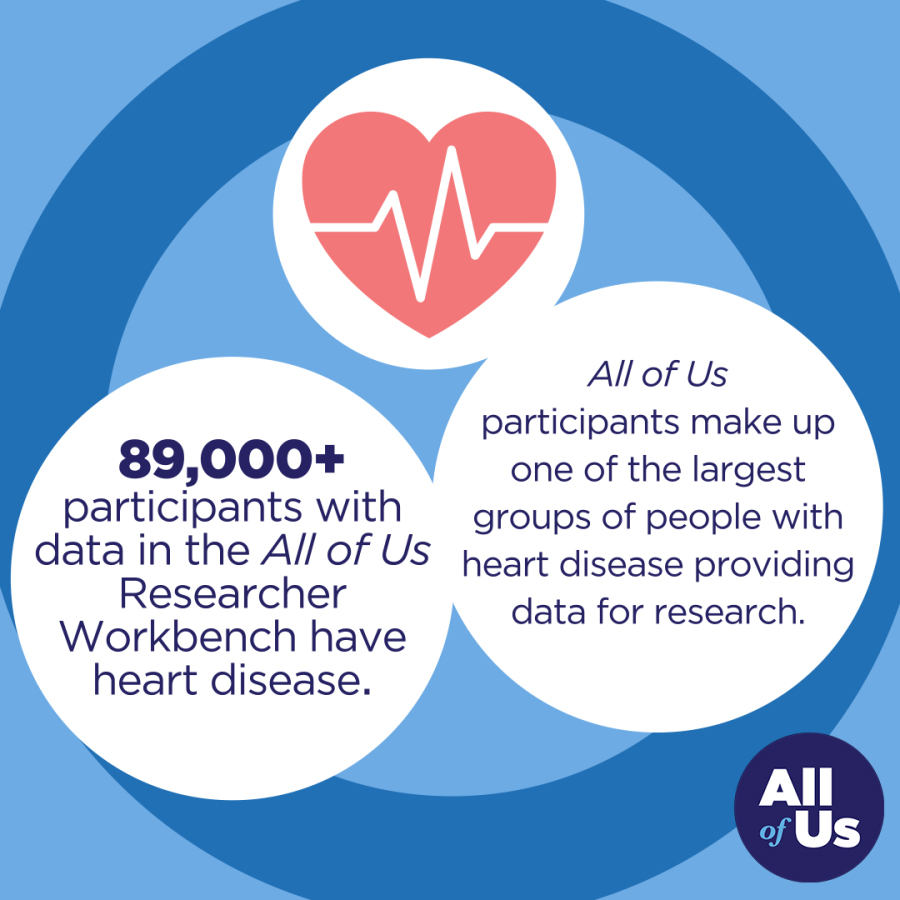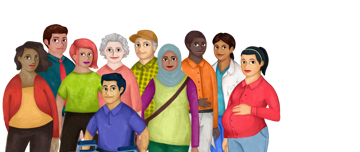
Heart disease is the leading cause of death in the United States – responsible for 1 in 5 deaths[i]. Data from the National Institutes of Health’s All of Us Research Program show that more than 89,000 participants have heart disease, according to electronic health record data. This includes different conditions, such as atrial fibrillation, congestive heart failure, coronary artery disease, heart attacks, and heart valve disease. Additionally, more than 36,000 All of Us participants nationwide self-reported these conditions in a survey and more than 100,000 participants shared that they have a close family member with heart disease.
This makes All of Us one of the largest datasets in the world for heart disease that is broadly available for research. The data that participants contribute help researchers explore important questions that could improve how to prevent, detect and treat heart disease, and deepen our understanding of how the disease is passed down through families. Individuals from different racial and ethnic communities face a disproportionate toll from heart disease. In 2019, African Americans were 30% more likely to die from heart disease than white Americans[ii] and in 2018, American Indians/Alaska Natives were 50% more likely to be diagnosed with coronary heart disease than people who are white[iii].
Health disparities, such as these, demonstrate the potential impact of the program's focus on engaging participants who have been historically underrepresented in medical research to ensure researchers have access to data to better understand the factors that influence health. For example, more than 90% of participants in large genomics studies to date have been of European genetic ancestry. Currently, the All of Us dataset includes information contributed by more than 413,000 participants, 75% of whom identify with communities underrepresented in medical research, including about 45% of whom identify with a racial or ethnic minority group.
“Participants’ contributions to All of Us are providing scientists with opportunities to advance heart disease research across the continuum of these diseases. These studies will lead to new heart disease risk models that work for all people, novel means to detect and diagnose diseases, and therapies for heart disease that are more applicable across all races and ethnicities in the United States,” said Geoffrey Ginsburg, M.D., Ph.D., chief medical and scientific officer of the All of Us Research Program. “This is an amazing opportunity to reduce morbidity and mortality in the United States.”
Returning Results to Participants
In addition to sharing data, participants can also choose to learn more about their own health, including whether they may be at increased risk of different types of heart-related conditions. Since the program began returning health-related DNA results in December 2022, more than 210,000 participants who have contributed blood samples have been invited to receive health-related research results, at no cost to them.
Participants can choose to receive research reports that help decipher what their genes say about certain health risks, including 22 different variations in the genes related to conditions that can increase the risk of heart disease, including familial hypercholesterolemia, hypertrophic cardiomyopathy, long QT syndrome, arrhythmogenic cardiomyopathy and others. Learning you carry certain variations in these genes could be important for screening for or treatment of heart disease.
Leveraging Data Types to Understand Cardiovascular Disease
Among the more than 8,500 research projects underway on a range of health topics, heart disease is one of the top three areas studied on the Researcher Workbench[iv]. In fact, there are more than 800 research projects on heart disease and related cardiac conditions underway on the cloud-based platform and more than 20 peer-reviewed studies about heart disease that used the All of Us dataset. These publications show how researchers are using All of Us data to answer important questions about these conditions. Outlined below are a few recent studies.
- Researchers at the University of Pittsburgh Medical Center used All of Us data to find new genetic clues to a rare condition called pulmonary arterial hypertension (PAH). PAH has no cure and causes high blood pressure in the lungs and arteries, which weakens the heart and can lead to heart failure. The research team identified the genetic factors that could be related to more severe cases.
- Researchers at Vanderbilt University Medical Center used All of Us data to identify existing drugs that could be repurposed to treat high cholesterol and high blood pressure. First, the researchers developed an approach for identifying whether drugs could be repurposed to treat other conditions. Then, they validated their results using the All of Us dataset.
- Researchers at the University of California, Irvine found that some newer treatments for high cholesterol were used less frequently than recommended for some people with diabetes, including those with known risk factors. The researchers identified potential racial and ethnic disparities in the use of these treatments, observing that White patients were more likely to be prescribed these drugs.
- Florida A&M University researchers used All of Us data to develop a model to potentially predict whether some people with type 2 diabetes are at risk for major heart problems, such as heart attack, stroke, or heart failure. The model could one day be incorporated into an online program that could help physicians predict these health conditions using commonly measured health indicators.
More than 750,000 participants have joined All of Us since 2018. Participants contribute different kinds of data, including data from survey responses, electronic health records, biosamples, physical measurements, and information from wearable devices. These data are made available through All of Us’ secure, cloud-based platform, which allows researchers to conduct sophisticated analyses quickly and easily with a variety of tools. All of Us invites researchers to register to use the Researcher Workbench.
[i] https://www.cdc.gov/heartdisease/facts.htm
[ii] https://minorityhealth.hhs.gov/omh/browse.aspx?lvl=4&lvlid=19
[iii] https://minorityhealth.hhs.gov/omh/browse.aspx?lvl=4&lvlid=34
[iv] Lunt C, Mayo K, Master H, Growing a research ecosystem in the cloud: Early insights from the All of Us Research Program; (Abstract #PB3215). Presented at the annual meeting of the American Society of Human Genetics, October 27, 2022, in Los Angeles, California.
 U.S. Department of Health & Human Services
U.S. Department of Health & Human Services

